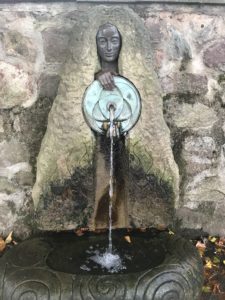The element of water is fundamental to life on earth. From it, life emerges. Water not only sustains plant and animal life but constitutes a major part of the human body. Through it, we pass from weakness to strength, from sickness to health and from this world into the next. Due to its life-giving properties, water is highly revered in spiritual traditions around the world, including in Celtic mysticism. The ancient Celts considered the places where water naturally emerged from the land, such as springs and wells, to be sacred.
What is a well?
Wells are purpose-built shafts, or portals into the earth, that enable us to access and draw up natural groundwater from underground aquifers. Wells have had cultural and spiritual significance since prehistoric times, which can be seen in the foundation of towns such as Wells and Bath in Somerset.
The mysticism of wells
Springs and wells are often found in spiritually high-energy places, such as Glastonbury’s Chalice Well, and are often said to be places that attract and are frequented by many spirits. Since the shape of a well is comparable with female genitalia, wells are said to have a particular connection with divine feminine energy, and they were a site where ancient people would gather to celebrate and honour the Goddess.
Making offerings and throwing coins into wells as a petition to the divine is an ancient tradition that continues to this day. Whilst our well-wishes of today might be for any number of reasons, in ancient Celtic lands, sacred wells were adorned with flowers and other offerings as a way of asking the Goddess of the well to preserve and protect the fertility of the land.

The Well hexagram in the I Ching*
In Chinese, the 井 character reads as ‘jing’, meaning ‘a well’. In ancient times, similar to Celts, Chinese people saw wells and springs as places of transformation and spiritual importance.
This is reflected in one of the I Ching oracle’s hexagrams, The Well, which means: ‘Return to the well of goodness’. No community can survive without a dependable source of pure water. In a similar way, human beings cannot survive without a reliable source of spiritual nourishment. In fact, we need two wells: an external source of guidance such as the I Ching, and an internal source of guidance, which must be our own good character. In the I Ching, ‘The Well’ hexagram encourages us to concentrate on developing, purifying and properly utilising our two ‘wells’.
The well in TCM
In Chinese medicine, the Jing-well acupuncture point is said to be a place where the two opposite energies of Yin and Yang meet to transform into Qi, the force of life.
Inspired by spiritual traditions of the past, we recognise Malvern that flows with pure water as our Axis Mundi**, our aim is to draw knowledge from the wealth of ancient traditions and combine this with modern science to provide health care, treatments and nourishment for the body, mind and spirit. Learn more about our approach to acupuncture and Chinese herbal medicine.
*The I Ching is an ancient Chinese text used for divination.
**The axis mundi is said to be a line or stem through the earth’s centre that connects its surface to the underworld and the heavens, and around which the universe revolves…

